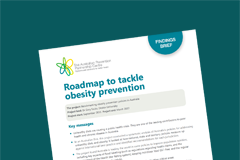Roadmap to tackle obesity prevention
In an Australian first, this project examined how national, state and territory policies for addressing unhealthy diets and obesity measure up against international best practice. Read this Findings Brief PDF for a summary of the key findings and relevance for policy and practice.
Key messages
- Unhealthy diets are causing a public health crisis. They are one of the leading contributors to poor health and chronic disease in Australia.
- In an Australian first, this project conducted a systematic analysis of Australia’s policies for addressing unhealthy diets and obesity. It looked at how national, state and territory policies measure up against international best practice and identified recommendations for each jurisdiction.
- The project found Australia is leading the world in some policies to improve population nutrition, including key aspects of food labelling (such as regulations regarding health claims, and the development of the Health Star Rating system); keeping nutritious food GST-free; and the regular monitoring of population body weight.
- However, Australia is falling behind international best practice in other critical areas.
- States and territories vary in their level of implementation of internationally recommended policies.
- There is a wide range of actions that each government in Australia could take to address unhealthy diets and obesity.
- This study identified critical action areas for Australian governments to tackle the rise of obesity through unhealthy diets, including:
- Developing a national strategy and implementation plan to improve population nutrition
- Imposing taxes to increase the price of unhealthy foods (especially sugary drinks)
- Introducing regulations to reduce exposure of children to marketing of unhealthy food.
